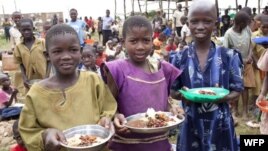14 January, 2015
Recent studies suggest the African nation of Burundi has the highest levels of hunger and undernourished people worldwide. More than 10 years of war, along with poverty and overpopulation, have strongly affected the nation's economic and nutritional conditions. Continued rising demands for limited resources create serious problems for Burundi.
Along many of the hillsides in Burundi's northern Ngozi province, workers are digging and planting. They hope to stop fertile soils from sliding away in what is considered the hungriest place on earth.
The United Nations World Food Program is currently paying more than 5,700 local farmers to work other people's lands. The WFP program, Food-for-Assets, comes after years of local farmers trying and failing to beat hunger by working their own land.

Children receiving food from the United Nations World Food Program.
Fifty-year-old Matthias Bukuru is one of the farmers. He says that the $1.25 wage he earns is a fortune compared to his past. He describes his former farming life as "self-enforced slavery." And he says he still went hungry.
He says he once worked on a farm and was paid just 12 cents a day. He says that amount would only buy him a small number of sweet potatoes. He says he could not feed his family.
Each year the International Food Policy Research Institute releases a Global Hunger Index report. The 2014 report showed the highest areas of hunger are in Africa south of the Sahara. The report describes Burundi and Eritrea as extremely high areas of hunger.
In East Asia and Southeast Asia hunger is common. However, in Thailand, Cambodia and Vietnam, the hunger situation has improved.
The report says Angola, Bangladesh, Chad and Ghana saw big improvement in dealing with the issue of hunger. So did Malawi and Rwanda. The report says there is very little hunger in the Near East, North Africa, Latin America and the Caribbean as well as in Eastern Europe and the Commonwealth of Independent States.
The Burundian civil war ended in 2005 after 12 years of fighting. The conflict left much fertile land unattended. Some also was repossessed. Overpopulation in the country has also increased pressure on food production.
Matthias Bukuru and many others say that they returned home after years in exile to infertile land and had no money to regenerate it.
Jean-Dominique Masumbuko is the agricultural coordinator for the Christian aid group World Vision. He says that the signs of hunger and poverty are clear to see on the faces of the people who sign up for the project.
He says the people show no sign of physical strength. He says they appear almost bloodless.
At a nearby clinic, crying babies, older children and underweight mothers fill the room. Some of the children are already in a World Food Program effort that feeds for extremely underweight children and breastfeeding mothers.
Pascaline Minani, has a 6-year-old son in the program. She walked five kilometers carrying her baby to get to the center. She is seeking supplements to improve her breast milk. She worries that without supplements her baby might suffer severe hunger.
But WFP workers find that Minani's measurements do not meet the requirement. She is not underweight enough to receive the supplements.
Pascaline Minani says she cannot stop thinking about food. She says her only wish is to feed her children once a day, and if there is more, she will feed herself.
The World Food Program says that recent studies show that feeding and agricultural programs have reduced malnutrition rates nationwide from 58 to 49 percent. The WFP says Burundi's government is eager to eradicate hunger.
I'm Marsha James.
Correspondent Hannah McNeish reported this story from Ngozi, Burundi. Marsha James wrote it for VOA Learning English. Christopher Cruise was the editor.
______________________________________________________________
Words in this Story
undernourished – adj. not getting enough food for good health and growth
fortune – n. a very large amount of money
regenerate – v. to grow again after being lost or damaged
supplement – n. something that is added to something else in order to make it complete
eradicate – v. to remove something completely
Is hunger a problem in your country? If so, are officials working to help people who do not have enough food? We want to hear from you. Write to us in the comments section.